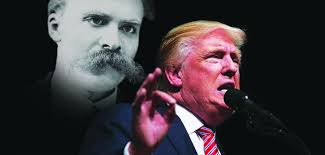In her book American Nietzsche (see my review), Jennifer Ratner-Rosenhagen argues that since the early 20th century Americans have used Nietzsche as a lens for understanding events, ranging from the demise of religion ("God is Dead") to World War II (Nazi as Übermensch) to postwar Existentialism. And so it is also with the phenomenon of Donald Trump. Some equate Trump's obsessive lying and embrace of "Fake News" with a moral relativism supposedly advanced by Nietzsche:
This equaling out of truth and falsehood is both informed by and takes advantage of an all-permeating late post-modernism and relativism, which has trickled down over the past thirty years from academia to the media and then everywhere else. This school of thought has taken Nietzsche’s maxim, there are no facts, only interpretations, to mean that every version of events is just another narrative, where lies can be excused as ‘an alternative point of view’ or ‘an opinion’, because ‘it’s all relative’ and ‘everyone has their own truth’ (and on the internet they really do).
Others see Trump as the embodiment of Nietzsche's Übermensch – Trump is interested only in his own power, he takes joy in using it to demean others, he has no empathy, he despises lower class 'losers', he ignores his own errors, he clearly considers himself far above the common man, and he gained his exalted status from his father. On Huffington Post the Pastor Austin Carey sees Trump as a "beyond good and evil" Superman:
In fact, for these {"Supermen)" it would never even be a matter of good, bad, or indifferent, because these men would be “beyond good and evil”—for the simple fact that they themselves would determine what was good and evil. Moreover, for these men there would never be any concern for the common good—because, in their eyes, nothing “common” could ever be “good.”Meanwhile, Nietzsche believed that the average person would look at these Supermen as heroes because in the Supermen they would see an expression of their own true nature: the nature they themselves are too weak to embrace but which they, all the same, resonate with strongly. The average person would champion the causes of the Supermen because they would see in the Supermen what they once upon a time saw in God and later saw in the community: a Savior—a source of hope.
Which leads me to this question: could it be that the very reason so many people are inspired rather than put off by Donald Trump is that he, for them, is Nietzsche’s Superman?The things Trump says and does are quintessentially Nietzschean: his unqualified crusade against “political correctness,” his unabashed boasts about his own power, his imperviousness to shame and guilt and regret.
And the fact that these are the very things Trump’s followers admire about him only underscores my point.
But are people mistaking Nietzsche's powerful cultural insights and analysis for advocacy? Nietzsche, of course, had little direct experience of democracy. But, as Ratner-Rosenhagen points out in her book, his greatest inspiration was the American democratic thinker Emerson. Nietzsche envisioned a grand trans-European unification – a European Union , if you will. but instead he watched Bismarck using a nationalistic Blut und Boden rhetoric to unifying Germany – leading to the fragmentation and tribalism that eventually resulted in two World Wars.
Hugh Drochon, the author of Nietzsche's Great Politics, rejects the notion that Donald Trump represents some kind of Nietzschean Übermensch:
I've heard it said that Trump may represent some approximation of Nietzsche's ubermensch, and I think that's deeply mistaken. But the reasons why it's mistaken can help us think about what Trump actually is. First, it's wrong because Trump represents everything Nietzsche hated. The philistinism, the mediocrity, the worshipping of money for its own sake — this is exactly the opposite of what Nietzsche advocated. By ubermensch, Nietzsche meant someone who could live beyond good and evil, beyond conventional values, who refused to appeal to herd instincts.
Rather, Trump embodies the antithesis of the Übermensch – The Last Man. "
“Last Man” is the kind of person who doesn't want to think, who fears progress, who is risk-averse and desirous of comfort, who just wants everything to stay the same. Of course, the people erupt in joy when they hear this because this is what they really wantThis is what Trump is to me. This is what he represents. He's a kind of "Last Man" demagogue, telling the people that he's going make things great again, which is to say simple and how they once were — and they love him for it."
The Trump Phenomenon is the culmination of a culture of mediocrity and ignorance – something Nietzsche clearly saw as a real possibility for post-Enlightenment society.


